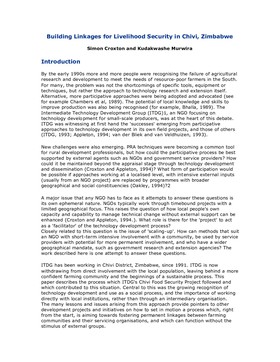Building Linkages for Livelihood Security in Chivi, Zimbabwe

Whilst participatory approaches are becoming a common tool for rural development professionals, new challenges are emerging about how the participative process be best supported by external agents such as NGOs and government service providers. The Intermediate Technology Development Group (ITDG) has been working in Chivi District, Zimbabwe since 1991. ITDG is now withdrawing from direct involvement with the local population, leaving behind a more confident farming community and the beginnings of a sustainable process. Rather than implementing an operational project in the conventional sense, the project sought to link farmers in Chivi with sources of information which, after ITDG's involvement finished, they could continue to tap themselves. These included government research stations, other NGOs and training institutions, and farmers in other districts. The project also aimed to build and strengthen local institutions, so that the process would be sustainable without continuing external support. The lessons from this approach provide pointers to other development projects and initiatives on setting in motion a process which, right from the start, aims to foster permanent linkages between farming communities and their servicing organisations, and which can function without the stimulus of external groups: No longer prepared to be passive recipients of information, farmers now seek it actively, accessing information on technologies from a multitude of sources. They are also able to negotiate with the multinational seed companies working in the area, as well as with grain buyers. Despite being a drought-prone area, yields have more than doubled since the project was initiated. Farmers' claims that "food security is no longer a problem" are borne out by indicators such as a shifting focus to the need for other factors, such as cash, sanitation, housing etc., and the lessened dependence on food aid. The government extension service is now developing a strategy to test and adopt a more participatory extension approach in the Province.
Cite this publication
Available at https://www.iied.org/6127iied